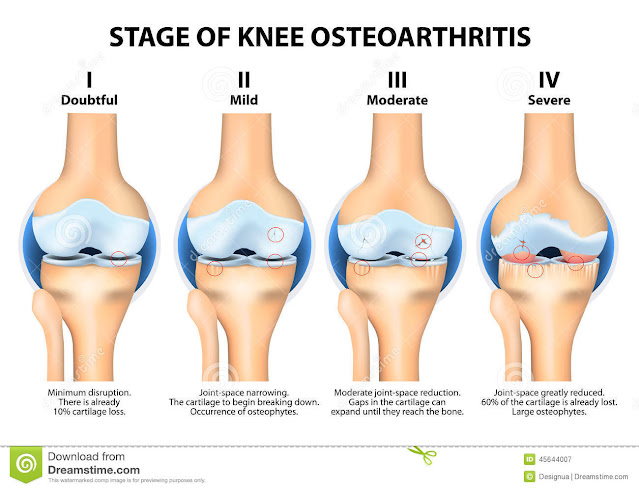If You Get a Knee Replacement in Your 40s or 50s How Long Will It Last?
Regenexx.com - We have been performing a grand experiment since the 1970s called modern orthopedic surgery. The idea is that by surgically intervening, we can fix musculoskeletal problems. While a reasonable idea, one side effect was that younger and younger people began to get operated. This trend combined with heavier and less active humans to have the first generation getting offered joint replacements at a young age. How is that experiment working out? Does it work to get a knee replacement in your 40s or 50s? Let’s dig in.
Knee Replacement in the Elderly
When knee replacement began in the 1970s, only the inactive elderly had enough arthritis to justify this procedure. Their needs were very modest. For example, a big outing may mean that grandma could walk the mall or grocery store. However, that changed with the advent of aerobics and the running craze of the 1980s.
How The 80s Fitness Craze Lead to Today’s Young Joint Replacements
Richard Simmons, Jane Fonda, and Arnold in the movie “Pumping Iron” changed the boomer generation. Suddenly being fit was better than just being skinny. This was the first generation that wanted to be fit into their old age.
This generation is now careening towards or now meets the definition of “elderly”. Our medical practice specializes in these patients who want to get much more out of their bodies than their parents. Their kids didn’t just participate in sports; they imbibed them in a way that caused many injuries only previously seen in professional single-sport athletes. That began the grand experiment that’s coming home to roost today, which was, “What happens if you perform orthopedic surgery on teenagers?”
At the same time, once these Gen X kids became adults, they began to gain more weight than their parents. That problem was like throwing gasoline on the joint arthritis bonfire created by operating on the young. Because of all of this, we have an explosion in early joint replacements in patients in their 40s and 50s. In addition, these adults now want to remain active. They want to ride bikes, jog, or pursue their favorite recreational sport, unlike their grandparents, whose activity needs were much more modest.
Young Joint Replacements are a BIG Problem
Research has shown that the need for knee replacement in the 30-59-year-old age group has increased more than 130-fold in the last several decades (1). There are some serious issues with this explosion:
- Knee replacement prostheses are only built to last 10-20 years based on activity level
- The activity expectations of younger patients are dramatically higher than older patients
- The second knee replacement surgery is more complicated and risky than the first
The key metric here to keep as many of these younger patients as possible only needing a single knee replacement procedure is how long the first prosthesis lasts. Let’s look at research on that topic.
Young Knee Replacement Research
Researchers at the Hospital for Special Surgery in New York looked at insurance data from 2007 to 2015 on patients who had a first knee replacement procedure and then categorized that data by age group (2). The nice thing about this approach is that it eliminates the bias we often see in research collected by orthopedic surgeons and focuses on real-world data on 114,698 patients.
This is the critical statement from the paper:
“Revision-free implant survival at 5 years was significantly worse in patients younger than 60 years of age, particularly those less than 40 years, who had a 77% revision-free implant-survival rate at 5 years.”
What’s the problem with this statement? If you were younger than 40, your chances of needing a second knee replacement surgery by 5-years was a whopping 23% or almost 1 in 4!How long does a knee replacement last for older patients, say in their early 50s? One study out of Oxford found that for men in their early 50s, about 1 in 3 (35%) needed a second knee replacement surgery (3).
The Solution?
If you need a knee replacement, you want a “one and done” procedure. That means that you want to be old enough to only need a single surgery in your lifetime. How old is that? Much depends on your activity level. If you’re more active, that age will need to be older and if you’re less active, that age can be younger. For most people that means the optimal age is the late 60s to early 70s. If you’re younger than that, then orthobiologic injections can help push the need for a knee replacement down the road.
The upshot? The children of the aerobic generation of the 80s are a grand experiment on what happens when people get severe knee arthritis in their 40s and 50s. The research shows that knee replacements at these ages are a problem for a large chunk of people. Hence, you want to push that surgery down the road as far as possible.
_______________________________________________
References:
(1) Jarkko Leskinen, Antti Eskelinen, Heini Huhtala, Pekka Paavolainen, Ville Remes. The incidence of knee arthroplasty for primary osteoarthritis grows rapidly among baby boomers: A population-based study in Finland. Arthritis & Rheumatism, 2012; 64 (2): 423 DOI: 10.1002/art.33367
(2) Anatone AJ, Richardson SS, Kahlenberg CA, Gausden EB, Figgie MP, Blevins JL. Decreased Implant Survival is Associated With Younger Patients Undergoing Total Knee Arthroplasty. HSS Journal®. 2022;18(2):290-296. doi:10.1177/15563316211007812
(3) Bayliss LE, Culliford D, Monk AP, et al. The effect of patient age at intervention on risk of implant revision after total replacement of the hip or knee: a population-based cohort study [published correction appears in Lancet. 2017 Apr 8;389(10077):1398]. Lancet. 2017;389(10077):1424-1430. doi:10.1016/S0140-6736(17)30059-4

.png)

.png)




.png)

Comments
Post a Comment